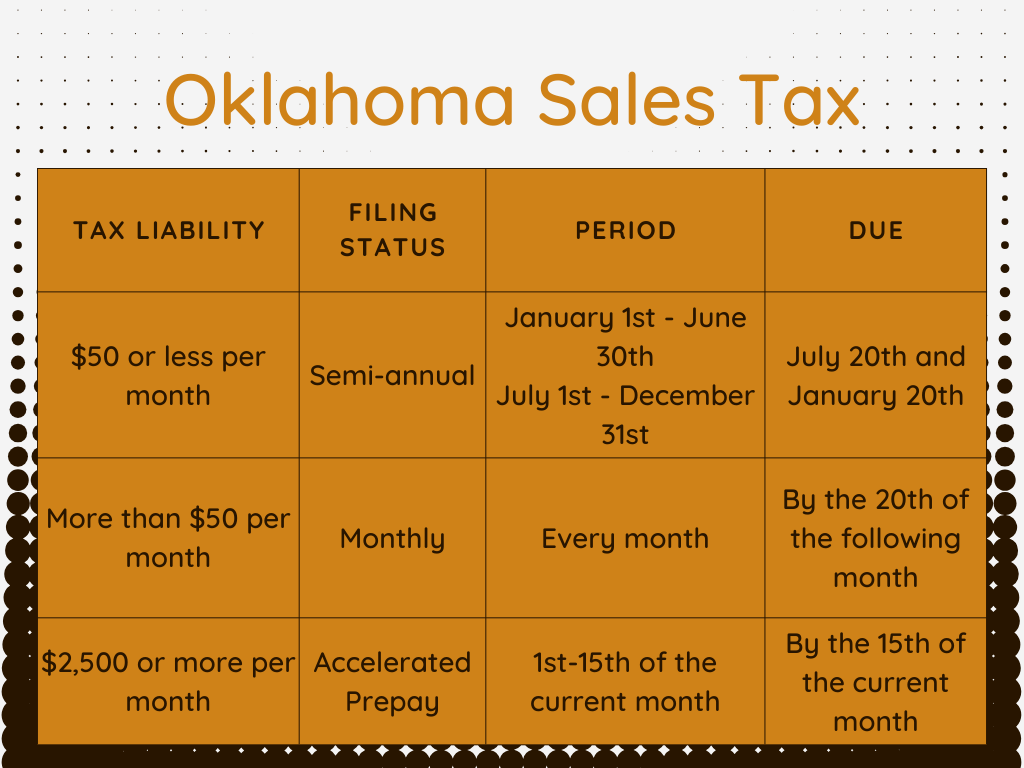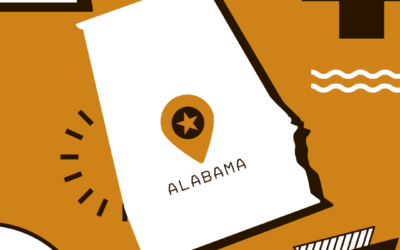Do you need to collect and remit sales tax in Oklahoma?
If you’re a business or retailer selling tangible personal property on an ongoing basis in Oklahoma, it’s essential to register with the Oklahoma Tax Commission and obtain a business sales tax permit. Tangible personal property includes anything that can be seen, weighed, measured, felt, or touched, as well as anything perceptible to the senses. In Oklahoma, this definition also covers electricity, water, gas, steam, and prewritten computer software.
But don’t worry, there are some exemptions to keep in mind. Sales for resale, transactions involving charitable health organizations, sales made to and by churches, museum admissions and purchases, and sales to governmental entities are all tax-free. Additionally, 100% disabled veterans can apply to be exempt from Oklahoma sales tax on purchases up to $25,000 per year.
Do you have sales tax nexus in Oklahoma?
Sales tax nexus determines whether a company must collect and remit sales tax in a particular state. As with most states, Oklahoma imposes two types of nexus: physical and economic.
Physical sales tax nexus in Oklahoma
Physical nexus is established when a business has a tangible presence in Oklahoma. Examples of this include:
- Storefronts
- Offices
- Warehouses
- Employees in the state
- Using third-party affiliates to promote or facilitate sales.
In contrast to economic nexus—which targets remote sellers—businesses with a physical presence in Oklahoma must collect and remit sales tax on all transactions, regardless of their sales volume. However, there are a few exceptions to this rule:
- Holding a valid Oklahoma exemption permit.
- Sales made to a customer with an exemption permit.
- Transactions occuring during a designated sales tax holiday.
Economic sales tax nexus in Oklahoma
Following the South Dakota v. Wayfair decision, many states introduced economic nexus laws to create a more equitable business environment. These laws set specific thresholds on sales or transaction volumes that, when exceeded by a remote seller, create an obligation to collect and remit tax in the state. This approach ensures that all sellers, whether remote or in-state, adhere to the same sales tax regulations.
In Oklahoma, economic nexus targets remote sellers without a physical presence in the state, but who still deliver taxable products or services within its borders.
Oklahoma’s economic nexus laws come into effect when a remote seller:
- Surpasses $100,000 in taxable Oklahoma sales in the previous or current calendar year.
Are marketplace facilitators required to collect and remit sales tax in Oklahoma?
As ecommerce continues to thrive, marketplace facilitators have become increasingly important in managing sales tax collection and remittance. In Oklahoma, if a marketplace facilitator’s combined sales within the state over the past 12 months meet or exceed $10,000, they are responsible for collecting and remitting sales tax on behalf of the sellers using their platform.
Remote sellers who only use a registered marketplace facilitator don’t have to worry about sales tax obligations in Oklahoma. However, if they also sell through their own website or other platforms, they’ll need to assess whether their combined taxable Oklahoma sales surpass the economic threshold. Note that marketplace facilitator sales do not need to be considered when determining nexus.
What platforms are marketplace facilitators?
What is a marketplace facilitator?
A marketplace facilitator, sometimes referred to as a Multivendor Marketplace Platform (MMP), is an online platform that allows customers to purchase goods or services from various vendors in one convenient location. These platforms can benefit businesses by increasing product visibility and attracting a larger customer base. Additionally, marketplace facilitators often have the legal responsibility to collect and remit sales tax on behalf of sellers, which can help ease the sales tax burden for businesses.
Filing Oklahoma Sales Tax
If you have sales tax nexus in Oklahoma, you might be wondering: what’s my next step? Follow the guidelines below for instructions on how to register for an Oklahoma sales tax permit, calculate sales tax rates, file sales tax returns, and maintain proper recordkeeping.
Registering for an Oklahoma Sales Tax Permit
- Gather necessary documents, including your FEIN, business information, and other relevant details.
- Register for a sales tax permit on the Oklahoma Tax Commission website (OkTAP). Or, if you need to register in multiple states, you can visit the Streamlined Sales Tax Registration System and submit a single application for all or any of their 23 registered states.
- Complete either of the above applications and wait for confirmation from the Oklahoma Tax Commission.
Calculating Oklahoma Sales Tax Rates
- Oklahoma’s state sales and use tax rate is 4.5%. Local taxes apply in some areas in addition to the state tax rate. You can find the current rates here.
Filing Oklahoma Sales Tax Returns
- For most taxpayers, returns must be submitted monthly. This depends upon monthly sales tax liability, (which we will cover more below).
- You can file your Oklahoma sales tax returns one of two ways:
- Filling out and submitting Form STS-20002-A, postmarked and paid by the due date.
- Creating an OkTAP account, where you can file returns and pay online.
Other Important Notes and Recordkeeping Requirements
- Be aware of penalties for late or incorrect filing. Remember that a return for each period must be filed even if there is no tax due.
- Maintain accurate records of all sales tax transactions, including invoices, receipts, and exemption certificates.
- Retain records for a minimum of three years in case of an audit.
When are sales tax returns due in Oklahoma?
Understanding the timing and requirements for filing sales tax returns is crucial for businesses to remain compliant. In Oklahoma, sales tax returns are due on or before the 20th of the month. However, different filing frequencies can make this simple due date a little more complicated.
Understanding Filing Frequencies
Filing frequencies refer to how often a taxpayer is required to submit sales tax returns and payments to a state. The premise itself is straightforward: based on your business activity, the state determines how frequently you need to report and pay the taxes you collect from customers. Typically, higher tax liabilities equal more frequent tax reporting, whereas the opposite is true for lower tax liabilities.
The common frequencies are monthly, quarterly, semi-annually, and annually, with some states offering or requiring accelerated monthly prepay for higher-volume businesses.
Why Different Frequencies Exist
This system is designed to balance the administrative workload both for businesses and state tax authorities.
More frequent filings ensure that states receive tax revenues in a timely manner, which is crucial for budgeting and expenditures. However, requiring all businesses to file monthly could place unnecessary burden on small businesses. State departments of revenue would also be inundated with returns all at once, which could place strain on online filing portals and delay return processing.
Conversely, allowing businesses with high sales volumes to report less frequently could delay the state’s access to significant tax revenues. As a result, different frequencies are assigned to each business based on tax liability or sales volume.
Oklahoma Filing Frequencies
Technically, there are only two sales tax filing frequencies in Oklahoma: monthly and semi-annual. However, there is one other reporting period that can be confusing for many businesses: semi-monthly electronic reporting.
Semi-Monthly Electronic Reporting
Businesses owing an average of $2,500 or more per month in sales tax are required to pay estimated taxes collected during the current month. This payment should be based on either:
- 90% of the actual tax liability collected from the 1-15th of the current month.
- 50% of the tax collected from the same month of the previous year.
For example, let’s say it is currently February 2024. The taxpayer will pay the estimated tax collected from February 1-15th before or by February 20th using either the 90% or 50% method. Fast forward to March 2024, and the taxpayer will pay the remaining tax due by March 20th along with filing their monthly sales tax return.
Monthly
Monthly filing frequencies are assigned to business taxpayers with an average tax liability of $50 or more per month. These returns cover sales made in the previous month. For example, sales tax collected in January is reported and paid by February 20th.
As stated above, some businesses are required to pay semi-monthly tax collected in addition to filing a monthly return. Remember that if you have made a payment on tax collected from the 1-15th of the previous month, you will subtract that prepayment from the total tax collected and pay the remainder when filing.
Semi-Annual
Taxpayers reporting an average tax liability of $50 or less per month are assigned a semi-annual filing status. Semi-annual returns are due by the 20th day of the month following the end of the six-month reporting period. For example, sales made to Oklahoma from January 1st-June 30th are paid and reported by July 20th, and sales from July 1st-December 31st are filed by January 20th.
Save the graphic below and never miss another Oklahoma sales tax due date!

Additional Tips for Oklahoma Sales Tax Compliance
- Due Date Adjustments: If a sales tax due date falls on Saturday, Sunday, or an observed state holiday, the return and payment are due by the next business day.
- Online Filing: The Oklahoma Taxpayer Access Point (OkTAP) allows for efficient online filing and payment, which is recommended for convenience, reduced errors, and faster processing. Additionally, online sales tax payments can be made via bank draft or credit/debit card.
- Outsource Your Sales Tax Obligations: If you’re looking for help with Oklahoma sales tax, we are a one-stop-shop for comprehensive sales tax services! Our range of services include nexus determinations, business registrations, compliance reviews, audit assistance, and filing sales and use tax returns. Contact us today for a free consultation!




